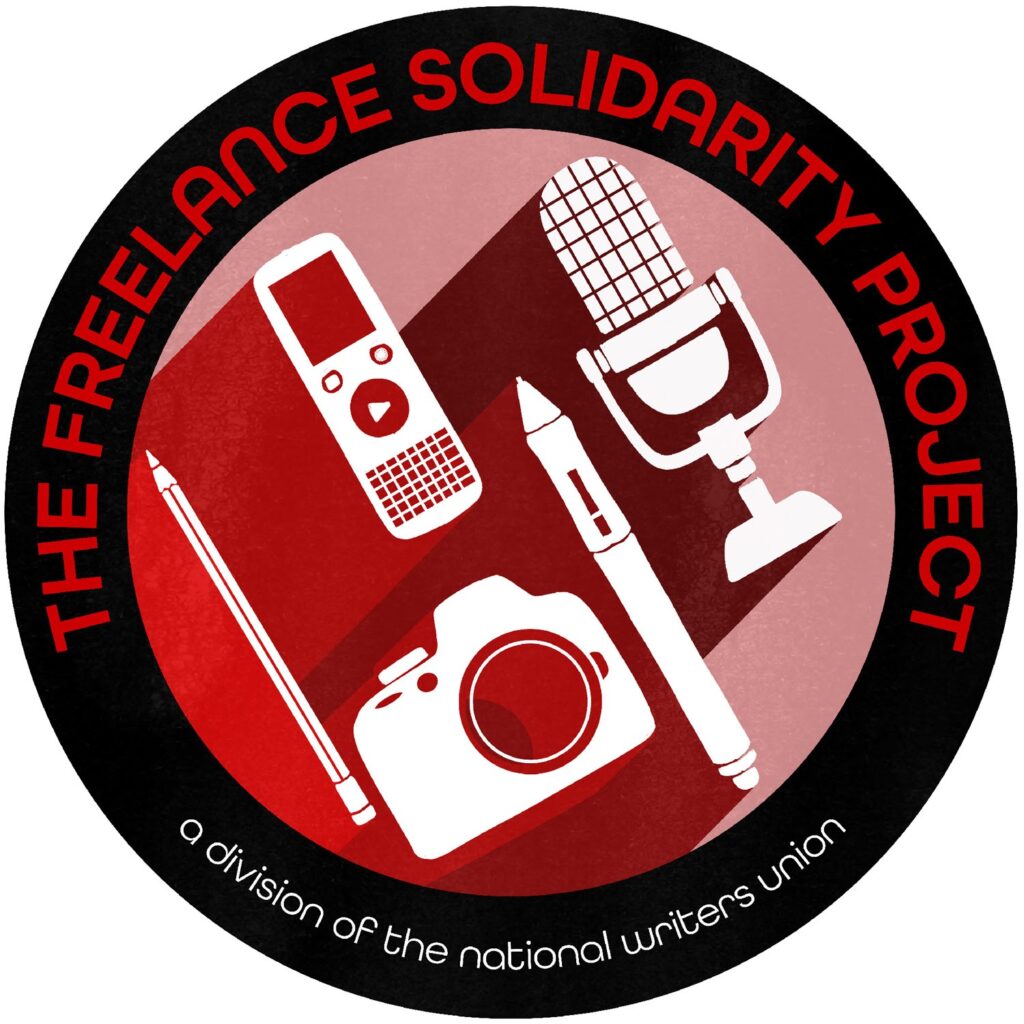
In light of the COVID-19 pandemic’s effect on our livelihoods, the Freelance Solidarity Project is calling on all print and digital publications to adopt a graduated payment schedule and rapid reimbursement policy for freelance work in progress since January 1, 2020. If a submission was assigned, filed, edited, or otherwise considered “in progress” this calendar year, publications should pay the freelance digital media worker a percentage of their negotiated total fee commensurate with the level of completed work.
Recommended Guidelines for Graduated Payment and Reimbursement During COVID-19
These are intended as a starting point for individual negotiations. We encourage workers in every part of our industry to use this language. Assigning editors and managers may refer to this document as a model for fair compensation during the pandemic and into the future.
- 50% of the negotiated total fee immediately on delivery of a first draft, including selects, samples, and/or audio or video clips. This initial payment can be thought of as a guaranteed “kill fee” or as partial payment toward the negotiated total fee.
- 50% of the negotiated total fee (for a total of 100%) on delivery of any work that is ready for publication, defined as work that requires no substantial revisions by the freelancer. This guarantees fair compensation regardless of delays in publication or circumstances beyond the freelancer’s control.
For many assignments, a third-third-third payout schedule is more appropriate. In such cases, we would recommend:
- 34% paid on assignment, as compensation for work up to and including delivery of a first draft.
- 33% paid on delivery of a second draft, defined as work that has undergone one round of revisions, edits, and/or notes from an editor or manager and has been returned by the freelancer with changes.
- 33% on completion of the freelancer’s work, defined as work that requires no substantial revisions by the freelancer.
Any expenses incurred by the freelancer in the course of the work should be reimbursed immediately.
All payments should be made within 30 days of invoicing. (If either the freelancer or the publication is based in New York City, the Freelance Isn’t Free Act stipulates that all payments must be paid within 30 days of invoicing.)
Terms and Ongoing Recommended Best Practices
For this document’s purposes, the term “freelancer” (or “freelance digital media worker”) includes but is not limited to: writers, editors, copy editors, photographers, fact-checkers, researchers, fixers, transcribers, social media editors, illustrators, artists, designers, audio/video producers, and engineers who have been contracted to provide their services, labor, time, or expertise.
As freelancers, we are all too aware of the precarious nature of freelance and contract work in this industry. We are routinely expected to shoulder the financial burden of work in early stages; to deliver drafts without the security of a retainer, deposit, or kill fee; and to receive payment long after our work is complete due to publishers’ shifting schedules. The pandemic has only exacerbated these conditions. In order for digital media to become a sustainable, equitable, and inclusive industry, its workers need fair and prompt compensation at every stage of their labor.
Freelance digital media workers and assigning editors/managers should agree on the scope of an assignment, deadline(s), total fee, and payment schedule before any work begins. These terms should be clearly stated and open to renegotiation as necessary during the course of the work. Expenses incurred in the course of the work should be paid by the assigning publication unless otherwise negotiated by the freelancer. Expenses incurred by the freelancer should be reimbursed as soon as possible. Assigning editors and managers should provide their freelancers with reasonable estimates of when a work will be published and do their best to continually update the freelancer of any delays or changes in scheduling.
Typically, the term “kill fee” refers to a percentage of the negotiated total fee that is paid by a publication once a decision has been made not to run or use the work. Because we believe that once work has been assigned, a contract is signed, and/or work has begun, this percentage is owed to the freelance digital media worker regardless of the finished status of the product or labor, we are recommending what we call a “graduated payment schedule” to encourage stages of compensation that can be negotiated between the freelance digital media worker and the assigning editor or manager.
These payments will honor the amount of labor done at different parts of the process and provide support to the freelance digital media worker in the course of their assignment.
How to Get in Touch with the Freelance Solidarity Project
The Freelance Solidarity Project is a distinct division of digital media workers under the National Writers Union. Any freelancers, publishers, editors, managers, and/or legal counsel who have questions about the practices outlined in this document can contact the Freelance Solidarity Project at FSP.Payment@gmail.com.
Any freelance digital media workers who are experiencing issues such as late payments, contractual breaches, or professional misconduct can contact us for representation. We also offer contractual reviews or advice on individual negotiations with editors and/or managers.
For more information on the National Writers Union and the Freelance Solidarity Project, visit our website. To become a member, sign up here.
FSP Calls for COVID-19 Graduated Payment Schedules (PDF)
FSP Calls for COVID-19 Graduated Payment Schedules One-Sheet (PDF)

 NWU is the sole provider of IFJ Press Passes to freelance journalists in the U.S.
NWU is the sole provider of IFJ Press Passes to freelance journalists in the U.S.